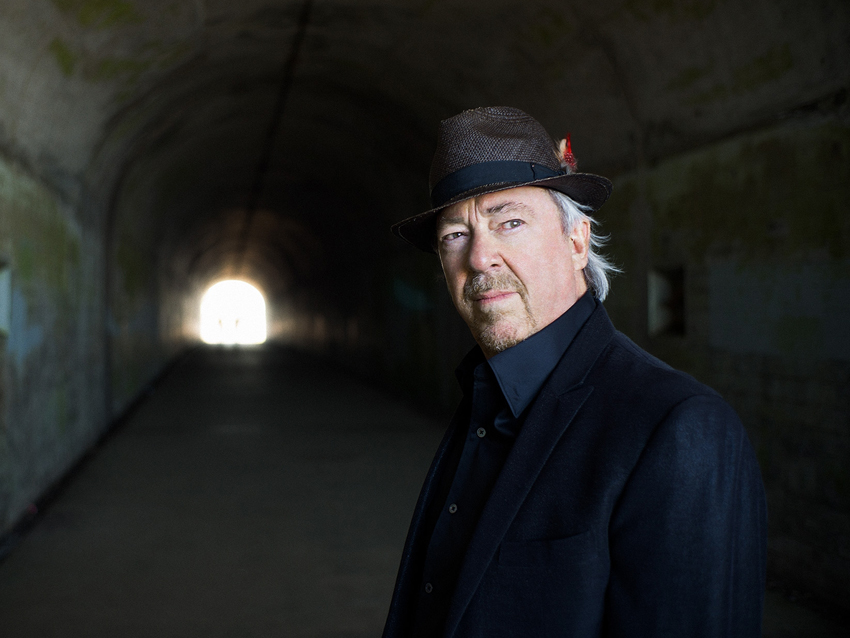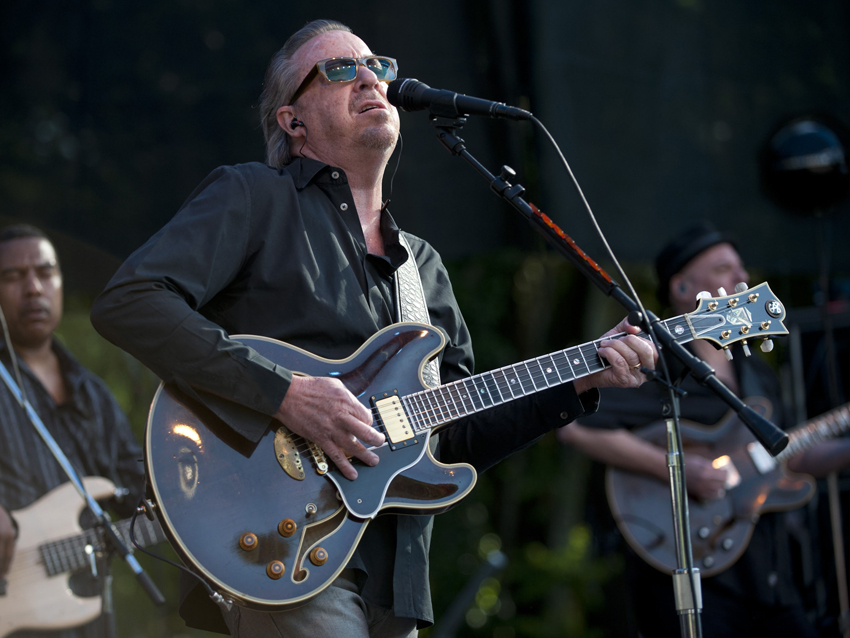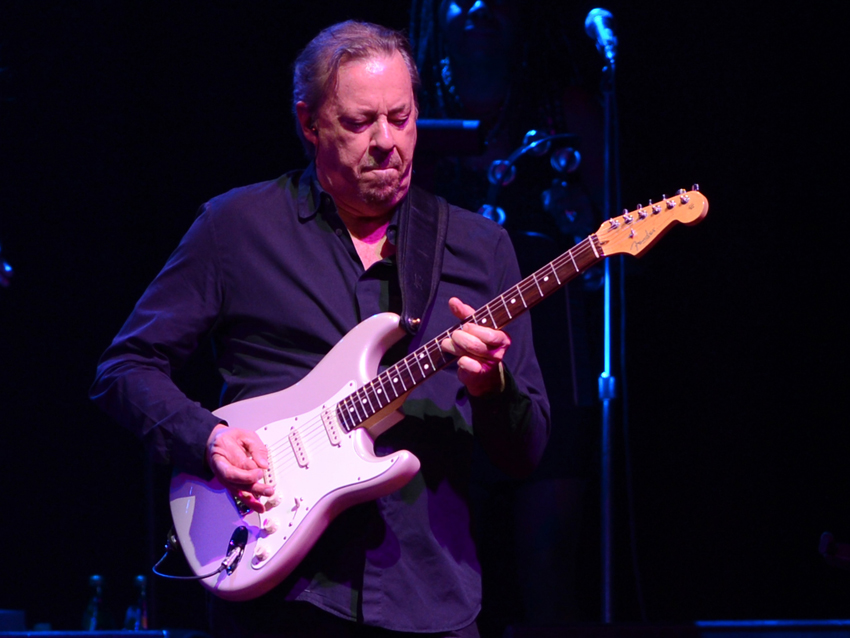
Boz Scaggs on producer Steve Jordan and new album A Fool To Care
Two years ago, Boz Scaggs and producer-drummer Steve Jordan paid tribute to the sounds and soul Memphis on an album named after that celebrated musical city. Now the two have collaborated again and continue their audio travelogue, this time drawing inspiration from Louisiana, Oklahoma and Texas on Scagg's upcoming album, A Fool To Care.
It's a luminous, beautifully crafted, perfectly played set of originals and astutely curated covers, on which Scaggs calls upon the services of a band that features Ray Parker Jr. (guitar), Willie Weeks (bass) Jim Cox (keyboards) and producer Jordan on drums. On the Scaggs original Hell To Pay, guitar great Bonnie Raitt duets and lays down her signature slide, and on a knockout cover of The Band's Whispering Pines, Lucinda Williams goes toe to toe vocally with Scaggs.
Scaggs sat down with MusicRadar recently to talk about working with Jordan, his songwriting process, and why he's holding firm on making albums in the age of the digital single.
You’ve always used some of the great session musicians. Do you worry that players of that caliber are becoming a thing of the past?
“I don’t worry about it too much. A lot of the great players are still out there, on the other end of the phone. They can still come play. But you’re right – the business has changed so much; the recording process has changed. On the other hand, so much of the things you hear do have the great studio players behind the scenes.
“I'm a musician, and I consider that group of players to be very important to what I’ve done. Their contributions to the music of my generation are pretty incalculable. It’s a struggle for them to keep their hand in it, but there’s film production and commercial production, background music, special events stuff. In New York, Nashville, London, and LA, there’s pockets for musicians to work and they’re shifting over to those other areas. I do see that it’s a bit of a dying art, but there’s still a lot going on.”
Speaking of Nashville, you recorded this album at Blackbird. Did you use the Massenburg Studio C room?
“We worked in the room right next to the Massenburg room to record; we mixed in another room. The Massenburg room has a digital console, which is used by a lot of the Nashville acts. We don’t use digital consoles, so there wasn’t a reason for us to go there. I did hope to do some playback there, but we never got around to it.”
You only wrote only one song, Hell To Pay, on the new album. Is songwriting a bit of a struggle for you, or are you just a really tough critic of your own work?
“It’s tough sometimes. Writing is a process that I get into and I get on a roll. I do a group of songs when I’m in that mode, and I promise myself that I’m going to continue. Sometimes it just gets away from me, though – it happens. I’ve been accumulating some songs that I hope to use on the next project, so it’ll feature more of my writing.
“This time, it wound up being more of a continuation of the work that Steve Jordan and I did on Memphis. In that vein, we cover some old music that I’ve always loved, and I discovered some great new writing. It’s just a different focus.”

Recording with Bonnie Raitt
Bonnie Raitt plays slide guitar and sings on that tune. Did you always hear a woman on it – Bonnie, in particular?
“I did hear Bonnie on that. What happened was, I had written it, and as I kept adding things to it, it started to become a process of figuring out what it was and what it needed. I sang a version of it by myself, but to be honest, I always thought of it as a duet. I knew that Bonnie would be perfect, but it ended up being a last-minute thing. For some reason, I didn’t call Bonnie – it was a busy time – but I had mentioned to Steve Jordan that it was a secret desire of mine to have Bonnie do it.
“Steve took it upon himself to call Bonnie, and then we sent her a demo of the song. She liked it a lot and wanted to do it. One thing led to another, and we wound up spending a day together, doing the duet and having her do the slide guitar overdub. It turned out to be a little act of fate, and now it’s one of the high points of my career, having Bonnie on one of my records.”
You list yourself as playing “guitar fills” on Full Of Fire. What’s with the modesty?
[Laughs] “I don’t know if it’s modesty; it’s just accuracy. When you’re making out the lists of who played what on the song, you start to look at it and you want to get things right. The list of who played rhythm guitar is pretty important. Ray Parker Jr. and Reggie Young played guitar on that. I just did the overdubs, the little fills. I wanted to distinguish who played what – I try to do that on every track.”
Last Tango On 16th Street – maybe it’s the instrumentation, but it reminds me of something Willy DeVille might have written.
“Wow, that’s interesting. I’m gonna think about that some more. Yeah… I can hear that, sure. It has that little street-like thing to it. There’s a bit of a Spanish reference to it, too. You’re right – it’s in that mode.”
You worked with Steve Jordan on Memphis. While he's producing the rest of the record, do you get to produce his drum tracks?
[Laughs] “Oh, no way. I wouldn’t go anywhere near that. I’ll let Steve make some suggestions about my voice, but I don’t have anything to say about how he plays the drums. He’s one of the handful of greats of our generation.”
You and he seem to have a great thing going. What’s the secret to your relationship?
“Well, Steve and I came up on a similar track. We both have great respect for American roots music, from basic blues to New Orleans and where it turned into R&B and rock ‘n’ roll, rockabilly and jazz, gospel and so on. We have similar musical minds in that way. Steve’s not only a brilliant drummer, but he’s also a scholar.
"He searches our various genres and veins of the musical experience, from the ‘60s and up to now. He’s very deep and knowledgeable, and as a producer he has a steady hand. Plus, we both have a lot of experience working with studio players. We get along really well. We like to work fast, we like to work with great players, and we have a shorthand that suits us – we can get right to it. He’s a real musical brother.”

Working with Steve Jordan
I love your version of The Impressions’ I’m So Proud – is that a song you’ve long wanted to do?
“Oh, thank you. Exactly. That’s one I’ve wanted to do for a while. I’ve been singing it ever since I first heard it, and I’ve always wanted to record it. This record gave me the right chance. This rhythm section made me think that it was the perfect time to bring it out. Actually, Steve had suggested that we do another song, Gypsy Woman, by Curtis Mayfield, and my reply to him was, ‘By all means, but let’s also do I’m So Proud.’”
What’s the process for choosing material? Is it like that – a give and take between you and Steve?
“We just talk it over. It’s something that’s been an ongoing process, but I've probably kicked it up after the album I made in the late ‘90s, Come On Home. I went through a lot of material for that one. I keep sort of a file of songs that are interesting. Sometimes I make little demos and try them out on my own. I did a lot of that when I worked with Michael McDonald and Donald Fagen when we did a project called The Dukes Of September. We spent months and sent a lot of e-mails back and forth going through pop songs and rhythm and blues material.
“So it’s been a continuum with me. Steve Jordan and I have been doing that. We have a little bit of a context, particularly with Memphis – there was a sound and a style that we wanted to explore. Going to Nashville, we gave ourselves a bit of a broader palette. Blackbird, as you know, is an extraordinary studio, with great equipment, so we felt as though we had more sonic territory to cover.
“Steve and I had a nice way of working. I pitch things to him, he pitches things to me; we put ideas together – yeah, it's a give and take. Then I go off and make some demos – maybe I change the arrangements a bit. I look for a key that feels right for me, and then we go back and narrow the list to 14 or 16 songs.”
What are your thoughts on making albums in 2015? Obviously, the format isn’t the juggernaut it once was.
“Yeah... It’s just a format that works for us. When we’re going to assemble the group of musicians, the album format is very efficient. To give it that budget, that time period and with those players, and to work with that material, it’s still a very efficient way to work. I know it gets disseminated and broken up into various formats when it goes out, but I do think that a certain generation likes that package. Obviously, the business has changed a lot, but for my generation and the people who like what I do, it’s still a format that works.”
It is interesting, tough: Back in the ‘50s and early ‘60s, the single was the dominant format. The Beatles and other artists ushered in the era of the album. But now we’ve come full circle in many ways, and the single is the format of choice for many people again.
“Yeah, that is interesting. I’ve never heard that put so succinctly, but you’re exactly right. In this age, with divided attention spans and the quick-moving aspects of the business, things do get divided in that way. But you know, music is music and business is business.”
Boz Scaggs' A Fool To Care will be released on March 31. The album is streaming and can be pre-ordered at Amazon. You can also pre-order at iTunes, Target, Walmart, and a bonus version can be pre-ordered at Best Buy.
Joe is a freelance journalist who has, over the past few decades, interviewed hundreds of guitarists for Guitar World, Guitar Player, MusicRadar and Classic Rock. He is also a former editor of Guitar World, contributing writer for Guitar Aficionado and VP of A&R for Island Records. He’s an enthusiastic guitarist, but he’s nowhere near the likes of the people he interviews. Surprisingly, his skills are more suited to the drums. If you need a drummer for your Beatles tribute band, look him up.
